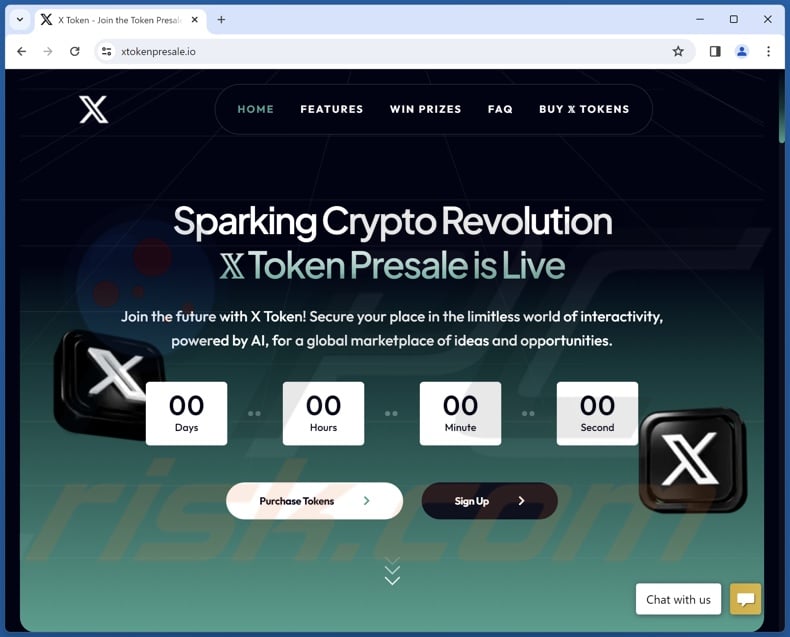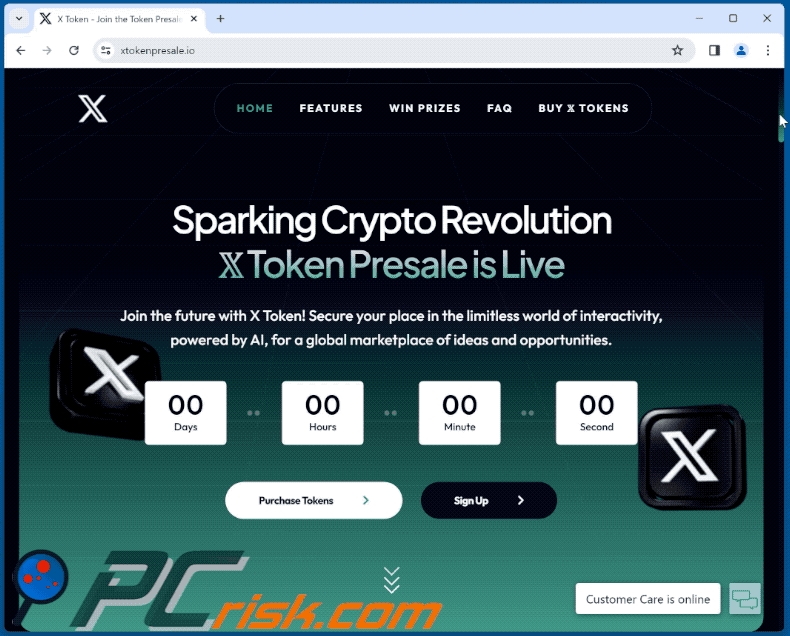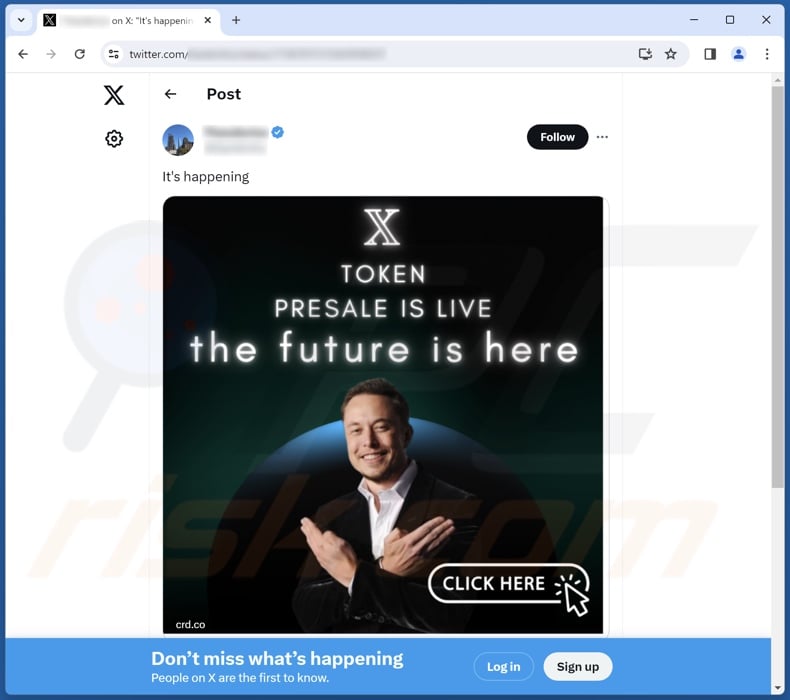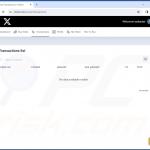Avoid getting scammed by presale events for the fake X token (X coin)
![]() Written by Tomas Meskauskas on (updated)
Written by Tomas Meskauskas on (updated)
What kind of scam is "X Token Presale"?
After investigating "X Token Presale", we determined that it is a scam. This is a sophisticated scheme that targets cryptocurrency, log-in credentials, and personally identifiable details.
Its lure is an exclusive presale event for the "X Token" – this currently nonexistent cryptocurrency is supposedly a new venture from Elon Musk, the owner of the X social media platform (formerly known as Twitter). This scam has been observed promoted via posts on X (Twitter) and fake online news articles.

"X Token Presale" scam overview
The "X Token Presale" scam is quite elaborate; it involves multiple stages with competently crafted graphics and disguises. The scheme heavily relies on the X (formerly Twitter) social media platform's branding and its owner, Chairman and CTO – Elon Musk.
On scam X posts, fake articles, and the deceptive website itself – the theme revolves around the launch of a cryptocurrency called "X". Throughout these sources, it is both referred to as the "X token" and the "X coin".
The scheme is presented as a presale event for this brand-new cryptocurrency. The main webpage claims that 64% of the presale pool has already been sold out. The current price for X is listed as 3.95 USD per token.
This page names a variety of brands associated with Elon Musk as "partners", i.e., Tesla, Neuralink, OpenAI, Grok, and others. It must be stressed that all the claims regarding this bogus presale event are false, and it is in no way connected to the X social media platform, Elon Musk, or any other legitimate individuals or entities.
After a user clicks the "Purchase Token" or "Sign Up" button, they are presented with an account creation form. This sign-up window requests standard information, such as name, email, phone number, and password. In instances of real registration on legitimate platforms, providing this type of data is of little to no risk.
However, this is a scam. Hence, victims' contact information could be sold to third-parties and used to promote other schemes, spam, and phishing scams. There is an additional risk in choosing a password since in case the same one is reused for other accounts/platforms – they are then in danger of getting stolen.
Once registration is completed, the user is redirected to another site claiming to be the "Official X Coin platform". The website expertly mimics an online cryptocurrency wallet. This fake wallet has multiple pages: cryptocurrency exchange rates to "X Coin", transaction history, accounts, how-to guides, etc.
Users can make "purchases" of "X" through this fraudulent platform by exchanging Ethereum (BTH), Bitcoin (BTC), Ripple (XRP), Stellar Lumen (XLM), Bitcoin Cash (BCH), Binance Coin (BNB), Tether (USDT), TRON (TRX), USD Coin (USDC), Dash (DASH), Waves (WAVES), Binance USD (BUSD), Cardano (ADA), Dogecoin (DOGE), and other cryptocurrencies.
However, the scammers will simply steal all that the user transfers to "purchase" X token/coin. By making these cryptocurrency transfers, the victim also risks exposing the log-in credentials of their actual cryptowallets.
The user can customize their account on the bogus platform by adding information like their date of birth or country of living/origin – these details could also be collected by scammers.
It is pertinent to mention that the fake wallet can be deleted within minutes or immediately after the victim transfers their cryptocurrency to buy the nonexistent token. Note that retrieving the transferred funds is practically impossible due to the untraceable nature of cryptocurrency transactions.
In summary, by trusting a scheme like "X Token Presale" – users can experience severe privacy issues, significant financial losses, and even identity theft.
If you believe that your log-in credentials have been exposed – immediately change the passwords/passphrases of all potentially compromised accounts/platforms and contact their official support. And if you have disclosed other private data to a scam (e.g., ID card details, credit card numbers, etc.) – contact the corresponding authorities without delay.
| Name | "X Token Presale" phishing scam |
| Threat Type | Phishing, Scam, Social Engineering, Fraud |
| Fake Claim | The scam is presented as an exclusive presale event for the nonexistent X token/coin. |
| Disguise | X (formerly Twitter), Elon Musk |
| Related Domains | xtokenpresale[.]io, xtokenbuy[.]com |
| Detection Names (xtokenpresale[.]io – main scam page) | Emsisoft (Phishing), Full List Of Detections (VirusTotal) |
| Serving IP Address | 104.21.17.150 |
| Detection Names (xtokensale[.]io – fake wallet) | N/A (VirusTotal) |
| Serving IP Address (xtokensale[.]io) | 172.67.180.80 |
| Detection Names (medium.crd[.]co – fake article) | N/A (VirusTotal) |
| Serving IP Address (medium.crd[.]co) | 172.64.150.187 |
| Distribution methods | Scam social media posts, fake news articles, compromised websites, rogue online pop-up ads, potentially unwanted applications. |
| Damage | Loss of sensitive private information, monetary loss, identity theft. |
| Malware Removal (Windows) | To eliminate possible malware infections, scan your computer with legitimate antivirus software. Our security researchers recommend using Combo Cleaner. |
Similar scam examples
"Bonk Coin scam", "CLAIM HYTOPIA TOKEN", "TeslaStrategy Giveaway", and "BNB Chain Airdrop" are merely a few examples of cryptocurrency-themed online scams.
The Internet is rife with deceptive and malicious content, which is in no way limited to this type of scheme. Various falls claims and promises are used to gain and subsequently abuse users' trust. However, the end goal is almost exclusively the same – to generate revenue at victims' expense.
How did I open a scam website?
The "X Token Presale" scam has been noted being promoted through posts on the X (formerly Twitter) social media platform and fake online articles. However, other promotional methods are not unlikely.
Spam (e.g., social media/ forum posts, DMs/PMs, emails, SMSes, notifications, etc.) is commonly used to endorse online schemes. Intrusive advertisements are used for this purpose as well. Additionally, adware can display scam-promoting ads or force-open webpages hosting them.
Users can inadvertently access deceptive pages by mistyping a URL (typosquatting). Scam websites can also be force-opened the moment a page that utilizes rogue advertising networks is accessed or when hosted content is interacted with (e.g., clicking buttons, ads, text input fields, links, etc.).
How to avoid visiting scam websites?
We strongly recommend exercising caution while browsing. Fraudulent and dangerous online content typically appears legitimate and harmless. For example, while spam browser notifications and intrusive adverts may look innocuous – they redirect to unreliable and questionable sites (e.g., scam-promoting, pornography, gambling, etc.).
We advise against using websites that offer pirated software/media or other dubious services (e.g., Torrenting, illegal streaming/downloading, etc.), as these pages usually employ rogue advertising networks. Another recommendation is to pay attention to URLs and enter them carefully.
Do not permit suspicious webpages to deliver browser notifications (i.e., do not click "Allow", "Allow Notifications", etc.). Instead, deny notification delivery from such pages (i.e., press "Block", "Block Notifications", etc.) or ignore these requests in their entirety.
We advise treating incoming emails and other messages with care. Attachments or links present in suspect/irrelevant mail must not be opened, as they can be harmful.
To prevent bundled/hazardous software from infiltrating the device – download only from official/trustworthy sources and treat installations with vigilance (e.g., read terms, study options, use "Custom/Advanced" settings, and opt out of supplementary apps, extensions, etc.).
If your computer is already infected, we recommend running a scan with Combo Cleaner Antivirus for Windows to automatically eliminate all threats.
Text presented in "X Token Presale" scam:
Sparking Crypto Revolution
Token Presale is Live
Join the future with X Token! Secure your place in the limitless world of interactivity, powered by AI, for a global marketplace of ideas and opportunities.
Appearance of the "X Token Presale" scam (GIF):

Screenshots of the fake cryptowallet promoted by the "X Token Presale" scam:
Screenshot of an X (Twitter) post promoting the "X Token Presale" scam:

Appearance of a fake news article promoting the "X Token Presale" scam (GIF):

Instant automatic malware removal:
Manual threat removal might be a lengthy and complicated process that requires advanced IT skills. Combo Cleaner is a professional automatic malware removal tool that is recommended to get rid of malware. Download it by clicking the button below:
▼ DOWNLOAD Combo Cleaner
By downloading any software listed on this website you agree to our Privacy Policy and Terms of Use. To use full-featured product, you have to purchase a license for Combo Cleaner. 7 days free trial available. Combo Cleaner is owned and operated by Rcs Lt, the parent company of PCRisk.com read more.
Quick menu:
- What is "X Token Presale" phishing scam?
- How to identify a pop-up scam?
- How do pop-up scams work?
- How to remove fake pop-ups?
- How to prevent fake pop-ups?
- What to do if you fell for a pop-up scam?
How to identify a pop-up scam?
Pop-up windows with various fake messages are a common type of lures cybercriminals use. They collect sensitive personal data, trick Internet users into calling fake tech support numbers, subscribe to useless online services, invest in shady cryptocurrency schemes, etc.
While in the majority of cases these pop-ups don't infect users' devices with malware, they can cause direct monetary loss or could result in identity theft.
Cybercriminals strive to create their rogue pop-up windows to look trustworthy, however, scams typically have the following characteristics:
- Spelling mistakes and non-professional images - Closely inspect the information displayed in a pop-up. Spelling mistakes and unprofessional images could be a sign of a scam.
- Sense of urgency - Countdown timer with a couple of minutes on it, asking you to enter your personal information or subscribe to some online service.
- Statements that you won something - If you haven't participated in a lottery, online competition, etc., and you see a pop-up window stating that you won.
- Computer or mobile device scan - A pop-up window that scans your device and informs of detected issues - is undoubtedly a scam; webpages cannot perform such actions.
- Exclusivity - Pop-up windows stating that only you are given secret access to a financial scheme that can quickly make you rich.
Example of a pop-up scam:

How do pop-up scams work?
Cybercriminals and deceptive marketers usually use various advertising networks, search engine poisoning techniques, and shady websites to generate traffic to their pop-ups. Users land on their online lures after clicking on fake download buttons, using a torrent website, or simply clicking on an Internet search engine result.
Based on users' location and device information, they are presented with a scam pop-up. Lures presented in such pop-ups range from get-rich-quick schemes to fake virus scans.
How to remove fake pop-ups?
In most cases, pop-up scams do not infect users' devices with malware. If you encountered a scam pop-up, simply closing it should be enough. In some cases scam, pop-ups may be hard to close; in such cases - close your Internet browser and restart it.
In extremely rare cases, you might need to reset your Internet browser. For this, use our instructions explaining how to reset Internet browser settings.
How to prevent fake pop-ups?
To prevent seeing pop-up scams, you should visit only reputable websites. Torrent, Crack, free online movie streaming, YouTube video download, and other websites of similar reputation commonly redirect Internet users to pop-up scams.
To minimize the risk of encountering pop-up scams, you should keep your Internet browsers up-to-date and use reputable anti-malware application. For this purpose, we recommend Combo Cleaner Antivirus for Windows.
What to do if you fell for a pop-up scam?
This depends on the type of scam that you fell for. Most commonly, pop-up scams try to trick users into sending money, giving away personal information, or giving access to one's device.
- If you sent money to scammers: You should contact your financial institution and explain that you were scammed. If informed promptly, there's a chance to get your money back.
- If you gave away your personal information: You should change your passwords and enable two-factor authentication in all online services that you use. Visit Federal Trade Commission to report identity theft and get personalized recovery steps.
- If you let scammers connect to your device: You should scan your computer with reputable anti-malware (we recommend Combo Cleaner Antivirus for Windows) - cyber criminals could have planted trojans, keyloggers, and other malware, don't use your computer until removing possible threats.
- Help other Internet users: report Internet scams to Federal Trade Commission.
Frequently Asked Questions (FAQ)
What is an online scam?
Online scams are deceptive messages that trick users into performing specific actions. For example, victims can be lured into disclosing sensitive information, making monetary transactions, purchasing products, subscribing to services, calling fake support lines, downloading/installing software, and so forth.
What is the purpose of online scams?
Online scams are designed to generate revenue. Cyber criminals profit primarily by obtaining funds through deception, abusing or selling private data, promoting content, and spreading malware.
I have provided my personal information when tricked by an online scam, what should I do?
If you have provided your log-in credentials – change the passwords/passphrases of all potentially compromised accounts/platforms and inform their official support without delay. However, if the disclosed information was of a different personal nature (e.g., ID card details, passport photos/scans, credit card numbers, etc.) – immediately contact the appropriate authorities.
I have sent cryptocurrency to the address presented in the "X Token Presale" scam, can I get my money back?
No, cryptocurrency transactions are practically irreversible due to their virtually untraceable nature.
Why do I encounter online scams?
Online scams are hosted on deceptive webpages. Most users access them via redirects generated by misspelled URLs, sites utilizing rogue advertising networks, spam browser notifications, intrusive ads, or installed adware. It is noteworthy that the "X Token Presale" scam has been observed being promoted through posts on the X (formally Twitter) social media platform and fake online articles.
Will Combo Cleaner protect me from online scams?
Combo Cleaner is designed to detect and eliminate all manner of threats. Its capabilities include scanning visited sites for deceptive and malicious content. Hence, should you enter a webpage hosting such – you will be warned immediately, and further access to it will be restricted.







▼ Show Discussion